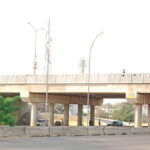The many cases of building collapse in Nigeria in recent times have amplified concerns among stakeholders and called to question the integrity of ongoing and completed building projects across the country, Weekend Trust reports.
From the North of Nigeria to the Southern region, dozens of buildings have collapsed in the last one and a half years with several fatalities and hundreds of injuries recorded.
To members of the public, incidents of building collapse have become a recurring decimal.
Apart from the billions of naira lost, many lives have been cut short on account of sudden collapse of buildings with many people, mostly labourers, often trapped, just as others are left incapacitated.
- Why illegal oil bunkering persists
- Ethnicity, religion, not my problem — General Martin Luther Agwai (former Army Chief)
Analyses by Weekend Trust indicate that in 2023, no fewer than 49 people died in different cases of collapsed structures with over 35 cases recorded.
But in 2024 alone, the fatalities from collapsed structures increased to 42, just a few days after the first half of the year.
The cases include collapse of uncompleted buildings, old structures caving in, including places of worship, as well as buildings partially collapsing.
In 2023, no fewer than 201 were injured in various cases, and the most fatal was the collapse of a classroom building at Monguno IDP Camp, in Borno, where six persons died and three were injured.
In the same year, four persons died at Agric Quarters, Mgbemena axis in Enugu, when a building collapsed. Also, a one-storey building collapsed at Egbu Umuenem, Otolo Nnewi, Nnewi-North Local Government Area of Anambra State, with three fatalities recorded.
Lagos, the nation’s commercial capital, appears to have become the epicenter of cases of building collapse with 10 out of 35 cases recorded in 2023. Last year, a 500-room building located at Agboye Estate, Oduntan along Ketu-Ikosi Road caved in with two persons injured while another two-storey building collapse was recorded at 34, Oloto street, off Borno way, Ebute Metta, Oyingbo, killing one person just before the end of the year.
Also last year, Anambra State featured prominently with a number of cases recorded in the South East state. A 20-storey building collapsed last year though without fatalities or injuries recorded.
The Federal Capital Territory (FCT) Abuja had its fair share of cases of building collapse. A two-storey building at 6th Avenue Gwarinpa collapsed in February last year, killing two persons and injuring 60.
Chronicle of cases
The year 2024 has, however, recorded more fatalities with the increased rate of collapsed buildings, according to data gathered by Weekend Trust.
While the Council for the Regulation of Engineering in Nigeria (COREN) – the regulatory body governing the practice of engineering, disclosed that Nigeria recorded 22 building collapses between January and July 2024, record from the Daily Trust Library indicated that 42 persons died from different cases of collapsed building as at July 15.
The recent and most fatal was the collapse of a two-storey building belonging to Saint Academy school, Busa Buji Community, Jos-north in Plateau State, where 22 persons died and 132 were injured.
In Anambra State, five persons died and 20 were injured when a two-storey building collapsed at Odu-Igbo market, Ochanja, Onitsha on 17th of February, 2024.
Another fatal incident was in Abia State last month where a three-storey building collapsed at Obingwu Community, Ukwa West Local Government Area, leaving five persons dead.
In May this year, a mosque collapsed at Papa Ajao area, killing three persons while in the same month, a four-storey building at No 15 Iga Idunganran in Lagos Island also collapsed with 11 persons injured. Similarly in April, a one-storey building collapsed at No. 5 Fanny Street, Ita Faaji, Lagos Island, killing one person and injuring three others.
Also recorded was the case of a bridge collapse in Ebonyi State at Mgbabeluzor village, Izzi Local Government Area, where two persons died and the cases continue on and one, with stakeholders raising alarm over the frequency of the cases, uncertain where the next incident would happen.
Brookings, a US-based organisation, in a report published in 2021 said, “Anecdotal evidence from various government agencies and a review of literature revealed that between 1974 and 2019, over 221 buildings collapsed across various Nigerian cities and more than half of the collapses occurred in the economic hub of Lagos. In fact, Lagos experienced 167 reported cases between the years 2000 and 2021, 78.4 per cent of which were residential buildings, 12.8 per cent were commercial and the remaining 8.8 per cent were institutional buildings. This spate of buildings collapse displaced more than 6,000 households with an estimated total loss of $3.2 trillion worth of property.
How poor building control, monitoring fueled collapse
Most of these incidents were often followed with outrage, condemnation and reactive actions with the lands taken over in some cases as obtains in Lagos.
Chapter 59, Section 74 of the Lagos Urban and Regional Planning Development (URPD) Law of 2010 states that in the event of the collapse of any property or structure due to negligence on the part of the owner, such property shall be forfeited to the state government after due investigation and/or publication in the state official gazette.
Over the years, the state has taken over such properties, especially the site of the 21-storey building in Ikoyi which occurred late 2021, where over 20 persons died. It was the most fatal incident in Lagos State in recent years with rescue operations lasting over one week.
Weekend Trust reports that since the incident, the state and the country have recorded several others which have cost the nation billions of naira.
At the heart of the crisis, according to stakeholders and others concerned with the spate of the incidents and the attendant loss of lives, is the corruption in the building approval process.
Recently, the Lagos State government began to demolish several buildings for contravening the building codes after the construction had been completed. Apart from that, many of the collapsed structures were found to have deviated from the original plan and approval received from authorities. A case in point was the Ikoyi collapsed building of 2021, where it was discovered that the developer who also died in the incident got approval for a 15-storey building.
Human rights and anti-corruption group, Coalition Against Corruption and Bad Governance (CACOBAG) recently raised an alarm over the huge losses suffered by property owners and developers in the state, saying this would have been avoided if officials charged with monitoring and approval of buildings had done the right thing before structures were developed.
Chairman of the coalition, Comrade Toyin Raheem, said no building would have been developed illegally if the appropriate authorities, especially LASBCA, had been up and doing.
He also called on the government to investigate allegations of corruption among its officials in charge of monitoring and approval of buildings and anyone found wanting should be punished.
In a letter to the governor, he said, “In the checks and balances mechanism, the Lagos State Building Control Agency (LASBCA) is supposed to discover and correct errors committed by the Lagos State Physical Planning Permit Authority (LASPPA).
“If monitoring officers of LASBCA had lived up to expectations, these huge losses being incurred by building owners and developers through demolition would have been nipped in the bud.
“Sir, do not treat LASBCA staff as sacred cows. Pampering them for long has been counterproductive. Your first tenure, 2019 to 2023 recorded the highest number of building collapses in the history of Lagos State.
“However, hardworking and sincere LASBCA officials, once identified, should be preserved and retained in the agency. Those are the agents of positive growth.
“For effective monitoring, Lagos State was divided into districts with LASBCA officials covering specific locations. Under this apportioned surveillance, it is virtually impossible for any building development in any part of Lagos State to escape the monitoring human radar in the LASBCA officials. That is why many buildings are marked in red X.”
Like Lagos, like Anambra
Anambra State has witnessed a high number of cases of building collapse recently. Though the state had experienced incidences of building collapse in the past, the cases rose in the past few months.
Some of the incidents were attributed to factors like government officials allegedly compromising integrity, poor construction work and non-professionals undertaking construction projects.
The two-storey building that collapsed at Ochanja market in Onitsha, killing at least five persons and injuring over 26 persons according to experts, was due to poor quality of work.
Building experts comprising architects, builders, surveyors and environmentalists expressed worry over non-compliance of processes by contractors.
Why buildings are falling – Stakeholders
Dr Ifeanyi Anyanechi, a member of the Nigerian Institute of Buildings, cited what he called hurried construction.
He said, “If you look at the construction work, you will discover that all the concretes here and the columns are still fresh and the construction was being done in a hurry. People said that they were doing the work day and night, despite knowing that concrete has a maturity period of two weeks or four weeks before you can impose any serious load on an already done concrete.
He said what they did was bad work because if the right sizes of rods were used, the building would, probably, not collapse.
“I don’t want to complain about the sizes of the rods because if a good workmanship was employed, the collapse would not have occurred and when you look at the links you will also discover that the links are supposed to be 8mm and at 2-2-5 center but they used 6mm and at times 900, 1,200mm center which were grossly inadequate and that was the reason for the sudden collapse,” he noted.
Lagos State Chairman of the Nigeria Institute of Architects (NIA), Arch. David Majekodunmi, in a chat with Weekend Trust said, “The issue of buildings collapse in Nigeria, is indeed alarming and requires urgent attention.”
Some of the causes he listed are; use of substandard materials, poor construction practices, lack of maintenance, inadequate regulations, among others.
According to him, lack of adherence to building codes and regulations has resulted in unsafe buildings, saying, “corruption at various levels, including among regulatory authorities, leads to compromised safety standards. Many buildings are not properly maintained, leading to structural weakness over time. There might be insufficient regulatory oversight and enforcement of existing building codes.
“The numbers you mentioned – 49 deaths last year and 42 in the first half of 2024 – are indeed troubling. It’s a clear indication that immediate and decisive action is needed to prevent further loss of life. This issue not only raises concerns about safety, but also about the overall governance and integrity of the construction industry in Nigeria.
“Addressing these challenges requires a coordinated effort from all stakeholders, including the government, regulatory bodies, construction professionals and the public. By taking comprehensive and proactive measures, it is possible to reduce the cases of buildings collapse and safeguard lives.”
Cost of materials
A former president of the Nigerian Institute of Building (NIOB), BDR Kunle Awobodu, in a chat with our correspondent, said there is the tendency for people to cut corners as a result of the skyrocketing cost of materials.
Weekend Trust reports that the Building Collapse Prevention Guild (BCPG) recently raised the alarm over the high cost of cement.
He appealed to President Bola Ahmed Tinubu to intervene in the matter.
According to the group charged with the responsibility of preventing collapse of buildings, frequent increase in the price of cement is one of the factors responsible for building collapse.
According to the group, if the price of cement should increase, the price of ready-mix concrete will also be increased while the cost of in-situ production of concrete will rise significantly.
The guild said, “Cement is an essential ingredient in the production of buildings. Frequency in the increase of its price has impacted negatively on the nation’s housing sector.
“Experience has shown that high prices of cement tend to encourage reduction in the quality of building production. The consequence of this is the emergence of weak buildings.”
Speaking along this line, Awobodu stated that there is a high tendency for people in the construction industry to cut corners as a result of the high cost of construction materials. He, however, said developers should not force themselves on any project.
He said, “You see, for a very long time, we have been cautioning our members not to force themselves on a project that fails to the real contract sum. When there is an apparent or full rise in the prices of building materials, people are bound to reduce quality and that was why we advocated that once you know that purchasing power has seriously been reduced, the project can be suspended or you have to review the drawing itself in order to reduce the size of the project, to cut your coat according to your size. Apart from cement, the increase in fuel price generally raised the transportation cost and it affected all products including granite sand. So, the prices of everything have skyrocketed and that is a great temptation for any developer, especially those who obtained loans from banks to see how they would manage materials.”
The need for deterrence
Many of the stakeholders also said there should be deterrence for any developer involved in a failed project, noting that with effective prosecution of those involved, there would be deterrence and those involved in construction would do the right thing.
“Building construction is a risky business. So, it has to be taken with all levels of caution. I think overseas, especially in developed countries, there are consequences for running afoul of the law. Whatever you do wrong, you are expected to pay for it,” he stated.
Built industry needs system reset
President of the Building Collapse Prevention Guild, Sulaimon Yusuf, in a chat with Weekend Trust, said there was the need for states to adapt the national building code which must be strictly enforced.
“The built industry needs a system reset, a total reset of the whole process starting from the government, to the people regulating at the national and state levels,” he said.
According to him, buildings don’t just collapse. There must have been warnings that people were careless about. The most worrisome is that a lot of lives are being lost and it is becoming an embarrassment to the nation. It is not good for the image of the country and it is not good for the profession.
“The states should adapt the national building code. There must be proper regulation that has to guide construction and the monitoring process. Everybody has a role to play, the national government has a role, the states have a role to play, as well as stakeholders.
“We need to take the campaign to the various levels in different languages so that it can sink in the mind of the people.”
Enforcement of discipline
Yusuf added, “The culprits need to be disciplined and prosecuted. Agencies of government responsible for monitoring need to be overhauled, they need to be properly responsible. We must monitor the agencies to make sure they do their work. When you look at the construction process, the agencies of the government need monitoring.
“On the part of the BCPG, there is need for proper collaboration with us to have a proper role within the monitoring.”
How we are preventing building collapses – Lagos agency
The Lagos State Building Control Agency (LASBCA) said it has taken measures to improve its presence at construction sites to mitigate the recurrent building collapses.
Olaoye Olusegun, Director, Public Affairs, LASBCA, in an interview with our correspondent, stated that while it is not the responsibility of LASBCA to grant approval for building, it would deepen its monitoring and evaluation of ongoing buildings to ensure that they are being constructed according to specification.
He, however, stated that by their estimation, there has been a reduction in the cases of collapsed buildings.
“We have embarked on massive public education on how to prevent building collapse because we have seen that most people are not aware of what to do when their buildings are distressed. They keep living there.
“So, we asked them to always inform us and other members of the public when they see any building that is distressed and no more habitable, so that we can act promptly and remove them,” he said.

 Join Daily Trust WhatsApp Community For Quick Access To News and Happenings Around You.
Join Daily Trust WhatsApp Community For Quick Access To News and Happenings Around You.


